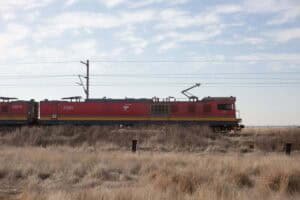The transport department is proposing an overhaul of the country's railway system.

Transport Minister Fikile Mbalula says South Africa is about to embark on a renaissance of its railways.
In its White Paper on National Rail Policy, the transport department is proposing an overhaul of the country’s railway system that is expected to span over the next few decades.
Top on the agenda is to make space for private investors and operators and to position the country’s railway system to become the backbone of a ‘seamlessly integrated transport value chain.’
“This not only creates policy certainty but also introduces radical structural reforms in the sector,” said Mbalula.
“This is intended to open up space for private sector investment and effective economic regulation that enables equitable access to both the primary and secondary networks.”
The transport minister acknowledged that problems with security, theft, vandalism and poor policies on railway services had weakened the system’s efficiency, limiting its contribution to economic growth and connecting communities.
Mbalula cited a 1986 report that advocated against new rail investments, which pushed large portions of the rail industry into acute decline.
“This also gave rise to deferred maintenance of passenger rail assets resulting in the subsequent decline of commuter rail over the decades, with sub-standard service being provided in areas that predominantly
serviced Africans.,” he said.
The new White Paper on National Rail Policy now enables investment in the railways, with specific attention to the following market spaces:
- Heavy haul
- Heavy intermodal, which includes double-stacked containers
- Contemporary urban and regional rapid transit
- Higher-speed of 160 to 200km/h and high speed up to 300 km/h.
“These interventions will also reposition both passenger and freight rail to achieve inherent competitiveness by exploiting rail’s genetic technologies to increase axle load as well as speed and train length across the board,” said Mbalula.
The new white paper also emphasises the need for improved rural access, increased mobility, increased job creation within the rail sector through infrastructure construction and contribute to economic development.
Crucially, over the next few years, railway systems will also provide support to the agricultural, agro-processing and mining sectors.
In relation to passenger rail service, the policy seeks to address the capacity challenges, where Prasa cannot run services, by introducing concessioning on other lines where the private sector can operate services.
Interestingly, the white paper supports devolving public transport functions to the lowest level of government.
“It is a harsh reality that municipalities do not have the requisite capacity to plan and operate railways in a
manner that enables a seamlessly integrated service that traverses municipal boundaries,” said Mbalula.
“This, therefore, requires of us to implement an effective model that will enable Cities and Provinces to deliver a seamlessly integrated public transport system, with commuter rail as its backbone.”
Mbalula said rampant theft and vandalism of railway infrastructure had stripped the country’s railway stations to the bare bones, and radical intervention was necessary to curb the relentless attack on railway infrastructure.
“We must eliminate this perverse incentive by banning export of scrap metal and therefore limit the market that aids this criminality,” said Mbalula.
“Taking this step will reinforce our other interventions aimed at protecting public assets and making theft of our cables and other metals less lucrative.”
NOW READ: Billions of rands in investments on the way, says Mbalula on fixing Prasa
Support Local Journalism
Add The Citizen as a Preferred Source on Google and follow us on Google News to see more of our trusted reporting in Google News and Top Stories.






